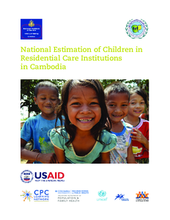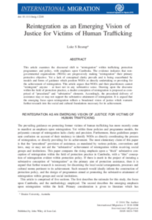This country page features an interactive, icon-based data dashboard providing a national-level overview of the status of children’s care and care reform efforts (a “Country Care Snapshot”), along with a list of resources and organizations in the country.
demographic_data
childrens_living_arrangement
children_living_without_bio
social_work_force
key_stakeholders
Key Stakeholders
Add New DataOther Relevant Reforms
Add New Datadrivers_of_institutionalisation
Drivers of Institutionaliziation
Add New Datakey_research_and_information
Key Data Sources
Add New DataMapping of residential care facilities in the capital and 24 provinces of the kingdom of Cambodia
National estimation of children in residential care institutions in Cambodia: A modelling study
Prevalence and number of children living in institutional care: global, regional, and country estimates
Shaping the national social protection strategy in Cambodia: Global influence and national ownership
Towards a Social Protection Strategy for the Poor and Vulnerable: Outcomes of the consultation process
Country Care Profile: Cambodia
Acknowledgements
Data for this country care snapshot was contributed by partners at Family Care First and UNICEF Cambodia.
Displaying 171 - 180 of 285
This document discusses how there is increasing international mobilization around the importance of family care for optimal child development.
The Minister of Social Affairs of Cambodia is visiting with officials in Spain and Malta to discuss intercountry adoptions of Cambodian children to those countries, according to this article from the Phnom Penh Post.
In this TED Talk, Tara Winkler, the Managing Director of the Cambodian Children’s Trust (CCT), discusses the detrimental impacts that family separation and orphanage placement have on children and speaks out against donating to, or supporting, orphanages in developing countries.
This post is part of the Better Volunteering Better Care Initiative’s month-long spread of articles aimed at raising awareness around the issues of orphanage volunteering. In this post, the author explains that, around the world, many orphanages are being run, not by government, but by church groups and individuals who start as volunteers. “The institutions are poorly regulated and they’re doing a job that could be done by the children’s families, with the right support,” says Smith.
The purpose of this consultancy is to build knowledge about the different forms of, and approaches to, arranging alternative care for children in communities in Cambodia, including pagoda-based care.
This manuscript reviews the issues facing children outside of households and argues for the importance of gathering robust data about this population to formulate responsive policies and services, mobilize resources, and foster accountability.
This article examines the discoursal shift to “reintegration” within trafficking protection programmes and policy, with emphasis upon Cambodia.
This article highlights the findings of a recent report on residential child care centers in Cambodia, published by the Ministry of Social Affairs, Veterans and Youth Rehabilitation (MoSVY) and UNICEF Cambodia, and discusses current programs and campaigns underway to enhance child protection and children’s rights in the country.
This article describes recent research on children in institutions in Cambodia.
A survey conducted by the Ministry of Social Affairs, Veterans and Youth Rehabilitation (MoSVY) in 2015 found that 11,788 children were living in 267 residential care institutions in five provinces alone. In 2014, only 139 residential care institutions were known to MoSVY in the same five provinces (housing 7,545 children), indicating a 92% increase in the number of recorded institutions.


